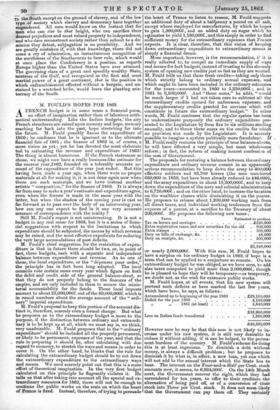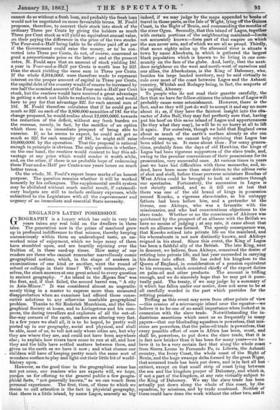M. FOUL]YS HOPES FOR 1863.
AFRENCH budget is in some sense a financial poem, an effort of imagination rather than of laborious arith- metical understanding. Like the Indian budgets, the airy French structures are raised upon memory and hope, memory reaching far back into the past, hope stretching far into the future. M. Fould possibly knows the expenditure of 1860; he confesses that he is ignorant as to the ultimate financial fate of 1861; the finance of 1862 is, of course, a mere vision as yet ; yet be has devoted the most elaborate toil to estimating the revenue and expenditure of 1863! The thing is almost humorous. If the French statesman so chose, we might now have a really business-like estimate for the current year 1862, founded on a tolerably accurate ac- count of the expenditure of the year just ended. But this having been made a year ago, when there were no proper materials at all for making it, it is not done again now when there are such materials, and we have instead another artistic "composition," for the finance of 1863. It is always far from easy to make a year's estimate and expenditure agree, even when the former is made In the same year with the latter, but when the shadow of the coming year is cast so far forward as to pass over the body of an intervening year, bow can any one expect to find in it any very accurate measure of correspondence with the reality ?
Still M. Fould's report is not uninteresting. It is not a budget in any real sense for 1863, but it is a series of finan- cial suggestions with respect to the limitations to which expenditure should be subjected, the means by which revenue may be raised, and the most effective expedients for reducing the very large accumulations of past deficits. M. Fould's chief suggestion for the restriction of expen- diture is that in future there should be two, or, in point of fact, three budgets, each with a separate and independent balance between expenditure and revenue. As to one of these, the local expenditure, or the " depenses pour ordre," the principle has in fact been long adopted. The local councils vote certain sums every year which figure on both the debit and credit side of the general balance-sheet, so that they do not properly belong to the finances of the empire, and are only included in them to secure the minis- terial accountability for the funds. These local imposts amount to about 25,000,0001. out of the 80,000,000/. which is in round numbers about the average amount of the "ordi- nary" imperial expenditure. M. Fould's proposal to keep this portion of the account dis- tinct is, therefore, scarcely even a formal change. But what he proposes as to the extraordinary budget is more to the purpose, if the distinction between ordinary and extraordi- nary is to be kept up at all, which we must say is, we think, very unadvisable. M. Fould proposes that in the "ordinary expenditure" should be included all the properly permanent, or likely to be permanent, expenses of the year, and that the rule in preparing it should be, after calculating with due regard to economy, to stretch the ways and means in order to cover it. On the other band, he thinks that the rule for calculating the extraordinary budget should be to cut down the extraordinary expenditure to the extraordinary. 'ways and means. We need scarcely point out that this is a mere effort of theoretical imagination. In the very first budget calculated on this principle he flagrantly violates it. He tells us that after taking into account all the special and ex- traordinary resources for 1863, there will not be enough to continue the public works on the scale on which the heart of France is fixed. Instead, therefore, of trying to persuade the heart of France to listen to reason, M. Fould suggests an additional duty of about a halfpenny a pound on all salt, except where employed for manufactures, by which he hopes to gain 1,300,0001., and an added duty on sugar which he eitimates to yield 1,160,0001., and this simply in order to find sufficient money for the extraordinary expenses that France expects. It is clear, therefore, that this vision of keeping down extraordinary expenditure to extraordinary means is simply a financial dream. More important, however, is the recommendation, if it is really adhered to, to compel an immediate supply of ways and means for both budgeti, instead of trusting to the slovenly system of opening new credits just as fast as they are wanted. M. Fould tells us that these fresh credits—taking only those which strictly belong to ordinary annual expenses, and which ought to have been included in the ordinary estimates for the years—amounted in 1860 to 5,250,0001.; and in 1861 to 6,100,000/. And "these sums," he adds, "would be much larger if I had not taken care to subtract all the extraordinary credits opened for unforeseen expenses, and the supplementary credits granted for services which will constitute in future the extraordinary budget." In ether words, M. Fould confesses that the regular system has been to underestimate purposely the ordinary expenditure pre- sented to the Legislature by from five to six millions sterling annually, and to throw these sums on the credits for which no provision was made by the Legislature. It is scarcely possible to imagine a system politically more fraudulent. If M. Fould really restores the principle of true balance-sheets, he will have 'effected a very simple, but most wholesome reform ; in fact, the reform of making honest confession of the cost of Government.
The proposals for restoring a balance between the ordinary expenditure and ordinary revenue consist in an apparently serious recommendation to keep down the army to 400,000 effective soldiers and 85,700 horses (the men numbered 660,000 in 1859, but have been already reduced to 446,000), and the army expenditure to about 15,200,0001., and to keep down the expenditure of the navy and colonial administration to 6,720,0001.; and on the other hand, to increase the taxation on the wealthier classes while diminishing it on the poorer. He proposes to release about 1,200,000 working men from all direct taxes, and individual working tradesmen from the expense of a patent, at a sacrifice to the Treasury of about 200,0001. He proposes the following new taxes :
Taxes. Estimated to produce.
Tax on horses and carriages £220,000 Extra registration taxes and new securities for the old 800,000 Extra stamps 380,000
Duty on bills of exchange, &c....... 48,000
Duty on receipts, &c 500,000
21,948,000 or nearly 2,000,000/. With this sum, M. Fould hopes to have a surplus on his ordinary budget in 1863, if hope is a term that can be applied to a conjecture so remote. On his extraordinary budget be was obliged, as we have seen, to add also taxes computed to yield more than 2,000,0001., thoukh he is pleased to hope they will be temporary—as temporary, we doubt not, as the wish for extensive public works. M. Fould hopes, at all events, that his new system will prevent such deficits as have marked the last few years, which have been, he says, as follows : Accumulated up to beginning of the year 1860 229,160,000
Deficit for the year 1860 4 160,000 1861 (at least) 5,640,000 Less on Italian funds transferred £40,320,000
However sure he may be that this sum is not likely to in- crease under his new system, it is still very desirable to reduce it without adding, if it can be helped, to the perma- nent burdens of the country. M. Fould's scheme for doing this is at least ingenious. To diminish a debt without money, is always a difficult problem ; but he proposes to diminish it by what is, in effect, a new loan, yet one which will not add to the annual interest which the State has to bear. The interest on the Four-and-a-Half per Cent. stock amounts now, it seems, to 6,934,0001. On the 14th March next, the Government recover the right, which they had surrendered for ten years, to offer to their creditors the alternative of being paid off, or of a conversion of their stock into Three per Cent. stock. It does not seem likely that the Government can pay them off. They certainly
238,960,000 1,360,000
cannot do so without a fresh loan, and probably the fresh loan would not be negotiated on more favourable terms. M. Fould proposes, therefore, to convert their stock into stock of the ordinary Three per Cents by giving the holders as much Three per Cent stock as will yield an equivalent annual value, on their paying the difference in the price of the two stocks. The Four-and-a-Half being liable to be either paid off at par if the Government could raise the money, or to' be con- verted into Three per Cents, do not, of course, command as good a proportionate price as the latter; and at the present rates, M. Fould says that an amouut of stock yielding 181. a year in Four-and-a-Half per Cents is worth less by 32/. than the stock yielding the same sum in Three per Ceuta. If the whole 6,934,0001. were therefore made to represent interest on the proper amount of capital in Three per Cents, the capital debt of the country would of course be increased by one half the nominal amount of the Four-and-a-Half per Cent stock, but the rentiere would have received a great advantage in getting a stock not liable to reduction in value, and would have to pay for that advantage 321. for each annual sum of 18/. M. Fould therefore calculates that if he could get as much as 32/. on each of the 3,800,000 annuities of 18/. for the change proposed, he would realize about 12,000,0001. towards the reduction of the deficit, without any fresh burden on the revenue, merely, in fact, by the sacrifice of an option which there is no immediate prospect of being able to exercise. If, as he seems to expect, he could not get so much as 321. for each annuity of 18/., he might still raise 10,000,000/. by the operation. That the proposal is rational enough in principle is obvious. The only question is whether, on the one hand, the rentiere would consent to buy this ad- vantage at any price which would render it worth .while, and, on the other, if there is no probable hope of redeeming these Pourand-a-Half per Cents some years hence on much better terms.
On the whole, M. Fould's report bears marks of an honest purpose. The question remains whether it will be worked honestly by his colleagues. The supplemental credit system may be abolished without much useful result, if extraordi- nary budgets are still to include ordinary expenses, while submitted to the Legislature with all the empreesement and urgency of an immediate and essential State necessity.































 Previous page
Previous page